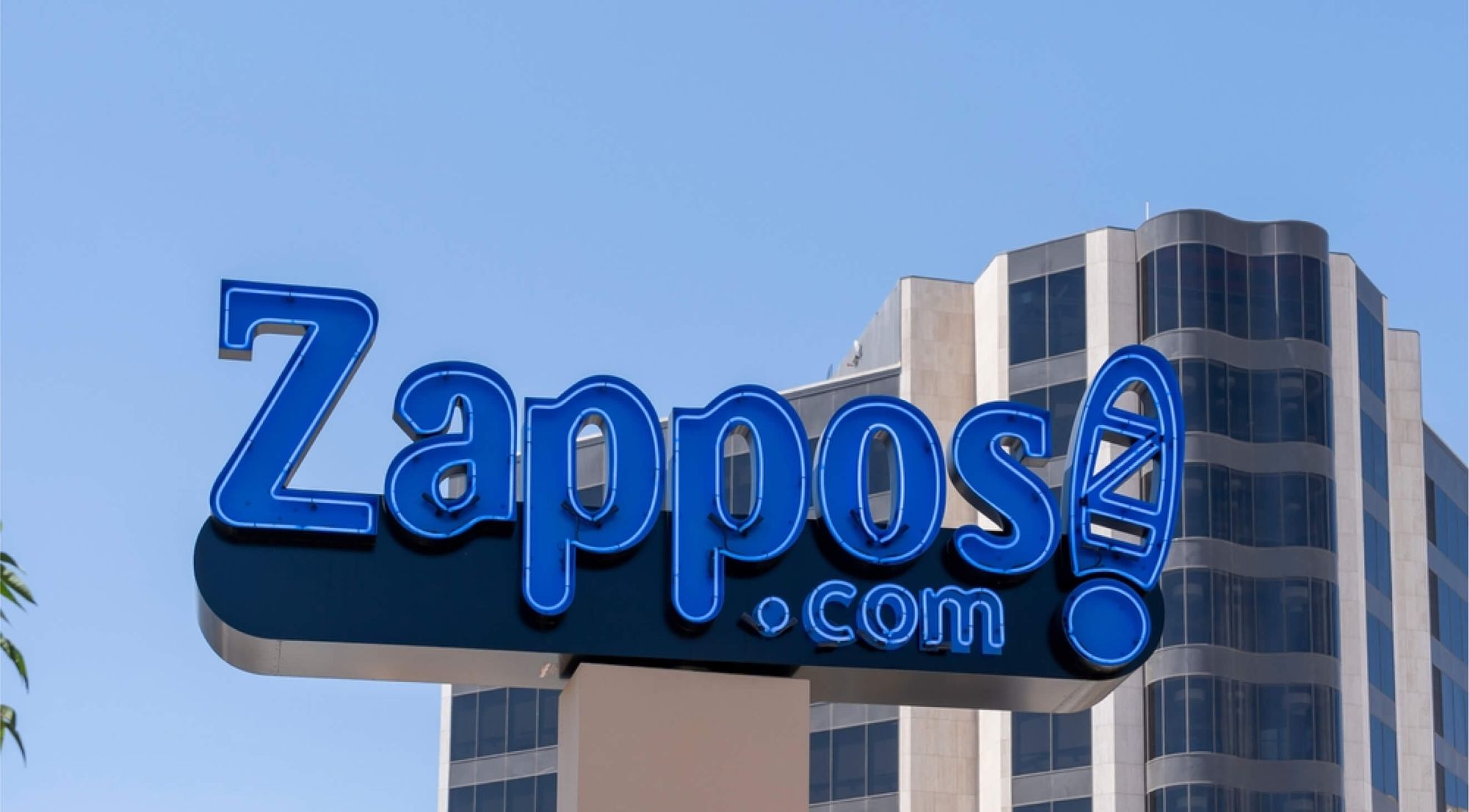Zappos company culture: What can be learned from a happiness-driven culture

Zappos, a leading online shoe and clothing retailer, is renowned not only for its vast product selection but also for its exceptional company culture. Founded in 1999, Zappos has become a household name, thanks in large part to its unique workplace environment.
The company's culture emphasizes happiness, customer satisfaction, and employee engagement, creating a thriving ecosystem that fosters innovation and growth. As Maya Angelou once said, "People will forget what you said, people will forget what you did, but people will never forget how you made them feel."
This quote encapsulates Zappos' philosophy of prioritizing emotional well-being, which not only creates lasting positive impressions on employees and customers but also drives the company's continued success.
In this blog post, we'll delve into the intricacies of Zappos' company culture, exploring its history, principles, leadership style, and more.
History of Zappos company culture
Zappos' journey as an online shoe retailer started with a clear mission: to deliver happiness through exceptional customer service. Tony Hsieh, the visionary former CEO, played a crucial role in shaping the company's unique culture, centered around core values that prioritize both employees and customers.
Zappos fosters a work environment that values open and honest relationships, creating a positive team and family spirit.
The company's core values, such as "Deliver WOW Through Service," "Embrace and Drive Change," "Create Fun and a Little Weirdness," and "Pursue Growth and Learning," are not just statements but guiding principles.
These values encourage employees to be open-minded and passionate, fostering a culture of innovation and engagement. By prioritizing these elements, Zappos has established itself as a service company that consistently delivers happiness to its customers and employees alike.
Importance of company culture at Zappos
At Zappos, culture isn’t a perk—it’s the engine behind every decision and success metric. Built on trust, authenticity, and purpose, Zappos corporate culture has become a benchmark for brands aiming to lead with values. Here’s how the importance of culture plays out across the Zappos company experience:
- The mission goes beyond profit: The Zappos mission statement, “To live and deliver WOW2,” sets the tone for a purpose-driven organization where delighting both customers and employees is the ultimate goal.
- Core values are embedded into daily work: Unlike many companies, Zappos values aren’t tucked away in a handbook—they’re actively practiced, celebrated, and referenced in decision-making, performance evaluations, and team rituals.
- Hiring filters for cultural alignment: Every new hire must pass a dedicated culture interview. This ensures alignment with Zappos employee culture, maintaining a strong cultural fabric as the company grows.
- Freedom fuels creativity and belonging: Employees are empowered to express themselves without rigid rules, fostering a fun, innovative atmosphere that boosts morale and engagement.
- Culture sustains the brand identity: The consistency of Zappos corporate culture enhances customer trust, fuels positive word-of-mouth, and supports long-term business performance through emotional brand loyalty.
10 Principles of Zappos company culture

The company’s culture isn’t just an HR initiative; it’s a deeply ingrained philosophy that drives everything they do. Below are the ten core principles that shape Zappos’ culture, making it a place where employees thrive and the brand excels.
- Deliver WOW through service: Zappos goes beyond customer expectations to create unforgettable experiences, ensuring a strong emphasis on exceptional service.
- Embrace and drive change: The company encourages adaptability and innovation, welcoming new ideas and reimagining ways to improve.
- Create fun and a little weirdness: Zappos believes in fostering a fun and unique work environment that encourages creativity and individuality, including activities like talent shows and happy hours.
- Be adventurous, creative, and open-minded: Employees are encouraged to take risks and think outside the box, promoting a culture of innovation.
- Pursue growth and learning: Continuous improvement is a core focus, with an emphasis on personal and professional development for all employees.
- Build open and honest relationships with communication: Transparency and trust are crucial, with a strong emphasis on clear and honest communication within the team and with business partners.
- Build a positive team and family spirit: Zappos promotes a sense of community and support, fostering a positive and collaborative team environment.
- Do more with less: Efficiency and resourcefulness are encouraged, promoting smart and sustainable business practices.
- Be passionate and determined: A commitment to excellence drives the company forward, with employees encouraged to be passionate about their work.
- Be humble: Despite their success and recognition, Zappos values humility and respect, ensuring that everyone remains grounded and approachable.
How Zappos reinforces its company culture?
Zappos doesn’t treat culture as a one-time initiative—it’s a continuous, company-wide practice. The strength of Zappos organizational culture lies in how deliberately it is nurtured every day through actions, systems, and shared values. Here’s how Zappos reinforces its culture across the organization:
- Hiring is centered around cultural fit: Every candidate goes through a culture interview to assess alignment with the core values of Zappos. This ensures that new hires embody the mindset and behaviors that support the existing culture from day one.
- Onboarding programs are culture-first: The company’s onboarding experience is designed to immerse new employees in Zappos organizational culture, not just their job responsibilities. It includes storytelling, value-driven training, and real-world exposure to customer service.
- Employee recognition is tied to values: Zappos regularly acknowledges employees who demonstrate the core values of Zappos in their daily work. Peer-to-peer recognition programs and leadership shoutouts keep culture alive and celebrated.
- Daily rituals and symbols reinforce culture: From value-themed meeting rooms to quirky office events, Zappos integrates cultural rituals that make values tangible and memorable across teams.
- Feedback loops ensure continuous alignment: Regular internal surveys, open forums, and leadership check-ins help keep the culture in sync with employee needs and evolving business goals.
Onboarding at Zappos: The $2,000 quitting bonus
Zappos has one of the most unconventional onboarding programs in corporate America. At the heart of it is a bold move—offering new hires $2,000 to quit if they feel the company isn't right for them. Here’s how this unique strategy works and how it ties into Zappos employee engagement, Zappos management style, and their broader Zappos value proposition:
- Orientation: New hires undergo an intensive four-week training that immerses them in Zappos' culture, customer service ethos, and company values—regardless of the role they were hired for.
- Experience: All employees, from marketers to engineers, spend time on the customer service floor to understand Zappos’ service-first approach and build empathy across teams.
- Offer: After the training, Zappos makes the infamous offer—$2,000 to walk away. This ensures only those genuinely aligned with the company’s values stay on.
- Commitment: Those who reject the bonus demonstrate commitment and cultural fit, strengthening long-term employee loyalty and reducing disengagement.
- Reinforcement: This practice exemplifies Zappos management style—empowering people to choose and reinforcing Zappos value proposition: happy employees create happy customers.
What is the leadership style of Zappos?

Zappos embraces a servant leadership style that flips the traditional hierarchy on its head. Instead of leaders commanding from the top, they exist to support, coach, and empower employees.
This approach is deeply tied to the company’s mission of delivering happiness—not just to customers, but to employees as well. Here’s how Zappos leadership stands apart and sustains a culture of trust and innovation:
- Leaders act as culture carriers: Managers at Zappos don’t just oversee operations—they actively model and reinforce the company’s core values. Whether it’s “Be Humble” or “Create Fun and a Little Weirdness,” leaders are expected to embody the behaviors they want to see in others.
- Decision-making is decentralized: In line with Zappos’ adoption of Holacracy, authority is distributed across self-managed teams. Leaders facilitate instead of dictate, allowing employees to take ownership of roles and decisions.
- Coaching over command: Managers serve as mentors, providing regular feedback, support for personal growth, and helping employees align their work with their passions and the company’s mission.
- Transparent communication is prioritized: Leaders promote openness, inviting feedback from all levels. This two-way communication builds trust and psychological safety within teams.
- Recognition and humility go hand-in-hand: Zappos leadership believes in spotlighting employee contributions, while remaining approachable and grounded—reinforcing the value of humility in leadership.
What are the goals of Zappos company culture?
Zappos has built a unique company culture that is intentional, strategic, and deeply rooted in values. Its cultural goals aren’t just feel-good ideals—they are directly aligned with Zappos business strategy and long-term growth. Here’s how the goals of Zappos business culture serve the company’s mission and vision:
- Create a purpose-driven workplace: One of the core objectives in the Zappos company overview is to deliver happiness through service. Culture is designed to give employees a strong sense of meaning, aligning personal values with organizational purpose.
- Empower employees to take initiative: A key part of Zappos employee empowerment is encouraging autonomy at every level. Employees are trusted to solve problems, innovate freely, and contribute ideas without bureaucratic barriers.
- Foster a culture of adaptability: Zappos promotes openness to change and continuous learning. This keeps teams agile and supports a flexible mindset that’s essential in a fast-paced retail environment.
- Strengthen internal relationships: A major cultural goal is to build honest, respectful communication across teams. This deepens collaboration, strengthens morale, and ensures every employee feels heard.
- Reinforce leadership through service: Zappos leadership prioritizes servant leadership—managers act as mentors and culture champions. This model fuels a cohesive team spirit and long-term organizational trust.
Customer service as a cultural extension at Zappos
At Zappos, customer service is more than a function—it’s a direct reflection of its cultural identity. The company's commitment to delivering happiness is expressed through every customer interaction, reinforcing the Zappos core values in action. Here’s how Zappos company turns customer service into a cultural hallmark:
- Customer service is everyone’s job: Every employee, regardless of department, is trained to handle customer calls, ensuring alignment with Zappos company values and a shared responsibility for customer satisfaction.
- No time limits on calls: Zappos once famously handled a 10-hour customer call—not to close a sale, but to ensure the customer felt heard. There's no pressure to rush, only to connect.
- Real conversations, not scripted ones: Agents are encouraged to be themselves, offering empathy and creativity in their approach. One rep even helped a caller find a local pizza place—not related to shoes, but deeply related to care.
- Surprise and delight moments: Unexpected upgrades, thank-you notes, and gifts are part of everyday service at Zappos, creating unforgettable experiences.
- Customer feedback fuels the culture: Feedback is used to continuously refine both service and culture, making customers active contributors to the evolution of Zappos company values.
Holacracy and self-management: How is this intertwined in Zappos’ culture?
In 2014, Zappos made headlines by fully embracing Holacracy, a bold and unconventional organizational model that eliminated traditional job titles and management hierarchies. This shift toward self-management was a radical move aimed at deepening employee empowerment and reinforcing the company’s cultural values of autonomy, adaptability, and continuous innovation.
At the core of Holacracy is the idea that decision-making should be distributed, not concentrated at the top. Instead of rigid reporting lines, Zappos employees operate within dynamic "circles" where they take on multiple roles based on skills and interest. Each role comes with clear responsibilities and accountability, giving individuals a stronger sense of ownership over their work.
This model aligns perfectly with Zappos’ emphasis on flexibility, learning, and responsiveness—qualities that are vital in a fast-changing eCommerce landscape. While the transition hasn’t been without challenges—such as confusion around roles and adapting to a new communication rhythm—it has ultimately helped reinforce Zappos organizational culture by allowing employees to shape their own contributions.
The system reflects the core values of Zappos, such as “Embrace and Drive Change” and “Be Adventurous, Creative, and Open-Minded.” Holacracy has transformed culture from a leadership directive into a collective responsibility, empowering every team member to lead from where they stand.
Zappos’ key to employee engagement and retention

Zappos is widely recognized for building a workplace where people love to stay and thrive. Its strategy for keeping employees engaged and loyal goes beyond perks—it’s about building a strong emotional connection through purpose and values, fueling Zappos employee satisfaction. Here’s how Zappos maintains high engagement and retention:
- Create purpose through values alignment: Zappos integrates core values like “Drive Change and Create Fun” and “Pursue Growth” into everyday work, helping employees find deeper meaning in their roles and feel connected to the company’s broader mission.
- Promote career development and learning: Employees are offered mentorship programs, workshops, and department-shadowing opportunities. This commitment to personal growth is a key motivator for long-term retention.
- Build inclusive, team-oriented experiences: Zappos nurtures a fun, collaborative environment through team events, volunteer days, and inclusive initiatives, making employees feel they’re part of something bigger than just a job.
- Celebrate wins through structured recognition: The Zappos employee recognition program includes public praise, value-based rewards, and internal “Zollar” currency. Recognition is frequent, genuine, and culture-aligned.
- Support holistic well-being: Flexible hours, wellness programs, and strong mental health resources ensure employees feel supported both inside and outside of work, reinforcing overall Zappos employee satisfaction.
25 Things to learn from Zappos company culture and incorporate in your organization
Zappos is renowned for its exceptional company culture, which prioritizes employee happiness, customer satisfaction, and a strong sense of community. By studying Zappos’ approach, organizations can gain valuable insights into creating a positive, engaging, and successful workplace.
- Prioritize employee happiness: Happy employees lead to happy customers.
- Foster open communication: Encourage transparency at all levels.
- Create a fun work environment: A little humor goes a long way.
- Encourage risk-taking: Innovation requires a willingness to fail.
- Promote continuous learning: Invest in employee development.
- Embrace change: Adaptability is key to staying competitive.
- Build strong relationships: Trust and respect are essential.
- Value individuality: Celebrate unique perspectives and talents.
- Lead with humility: Stay grounded and approachable.
- Focus on customer service: Go above and beyond for your customers.
- Offer flexibility: Allow employees to manage their schedules.
- Recognize achievements: Celebrate successes, big and small.
- Encourage teamwork: Collaboration leads to better results.
- Maintain work-life balance: Prevent burnout and promote well-being.
- Promote sustainability: Implement eco-friendly practices.
- Empower employees: Give them the autonomy to make decisions.
- Provide clear goals: Ensure everyone knows the company's objectives.
- Invest in technology: Leverage tools to enhance efficiency.
- Cultivate a positive attitude: Positivity breeds success.
- Be transparent: Share information openly with your team.
- Encourage feedback: Use it as a tool for improvement.
- Support community involvement: Encourage employees to give back.
- Focus on personal growth: Help employees achieve their goals.
- Build a strong Brand: Your culture is part of your brand identity.
- Stay true to your values: Consistency builds trust and loyalty.
How pulse surveys help sustain a people-centric culture like Zappos
Maintaining a people-centric culture like Zappos requires more than just setting values—it demands continuous listening and adaptation. Pulse surveys offer a powerful, real-time way to stay connected with employee sentiment and ensure the culture remains responsive, inclusive, and aligned with company values. Here’s how pulse surveys help sustain such a culture:
- Capture ongoing employee feedback: Pulse surveys allow organizations to gather short, regular feedback from employees. This helps leaders understand what’s working, what’s not, and how employees truly feel in the moment.
- Identify culture-health trends early: By tracking responses over time, companies can spot emerging issues or declining morale before they become bigger problems. It supports early intervention aligned with people-first values.
- Reinforce value alignment: Surveys can be designed around key cultural themes—like recognition, growth, or communication—to evaluate how well the organization is living its values, just like Zappos does with its core principles.
- Empower data-driven leadership: Leaders can use insights from surveys to make informed, empathetic decisions that directly reflect employee needs and foster a high-trust environment.
- Promote a two-way communication loop: Pulse surveys signal to employees that their voices matter. When feedback is acknowledged and acted upon, it strengthens engagement and cultural loyalty across the organization.
Conclusion
Zappos stands as a prime example of how a deeply embedded, values-driven culture can become a company’s greatest competitive advantage. From onboarding with the $2,000 quitting bonus to empowering employees through self-management and servant leadership, Zappos has built a work environment that prioritizes happiness, engagement, and purpose.
Its approach to leadership, employee recognition, and decentralized decision-making reflects a long-term investment in people—not just profits. This model of workplace culture fosters innovation, strengthens retention, and builds a brand that customers and employees are proud to be part of.
For organizations aspiring to build a culture like Zappos, it’s essential to move beyond surface-level perks and focus on genuine employee engagement and alignment with core values. That’s where CultureMonkey makes a meaningful impact. CultureMonkey helps HR leaders and managers measure employee sentiment, gather real-time feedback, and act on insights to create a more connected and engaged workforce.
Whether you're scaling culture across teams or reinforcing trust and transparency, CultureMonkey gives you the framework to cultivate a workplace where people thrive and purpose drives performance.
FAQ
1. What makes Zappos’ company culture unique?
Zappos’ company culture is unique because it blends employee empowerment with a deep commitment to delivering exceptional customer service. Core values like “Deliver WOW Through Service” and “Pursue Growth” shape daily operations. The culture emphasizes fun, transparency, and autonomy, creating a workplace where employees feel valued and inspired to deliver memorable customer experiences that align with the brand’s mission.
2. Is Zappos still using holacracy in 2025?
As of 2025, Zappos no longer fully follows the Holacracy model. While it initially embraced Holacracy to encourage self-management and reduce hierarchy, the company has since adapted its approach. Elements of decentralized decision-making remain, but Zappos has shifted to a more flexible structure that better aligns with its evolving business needs and organizational culture.
3. How do Zappos’ core values influence their hiring process?
Zappos’ core values play a central role in their hiring process by ensuring candidates align with the company’s culture before job skills are evaluated. This cultural fit drives long-term business success, fosters customer service excellence, and supports a team committed to delivering outstanding customer service. Each hire is evaluated on how well they embody Zappos’ values in action.
4. Does Zappos culture improve employee retention?
Yes, Zappos’ strong workplace culture significantly improves employee retention. By encouraging employees to be authentic, take ownership, and grow within the organization, Zappos creates an environment where people feel valued and motivated. The company’s focus on purpose, recognition, and alignment with core values helps build loyalty and reduces turnover across teams and departments.
5. Can traditional companies apply Zappos’ culture model?
Yes, traditional companies can apply Zappos’ culture model by fostering an open minded pursue growth mindset and shifting toward a more customer centric culture. While it may require structural and mindset changes, integrating core values, empowering employees, and prioritizing customer experience can help legacy businesses build a more adaptive, engaged, and values-driven workplace similar to Zappos.



